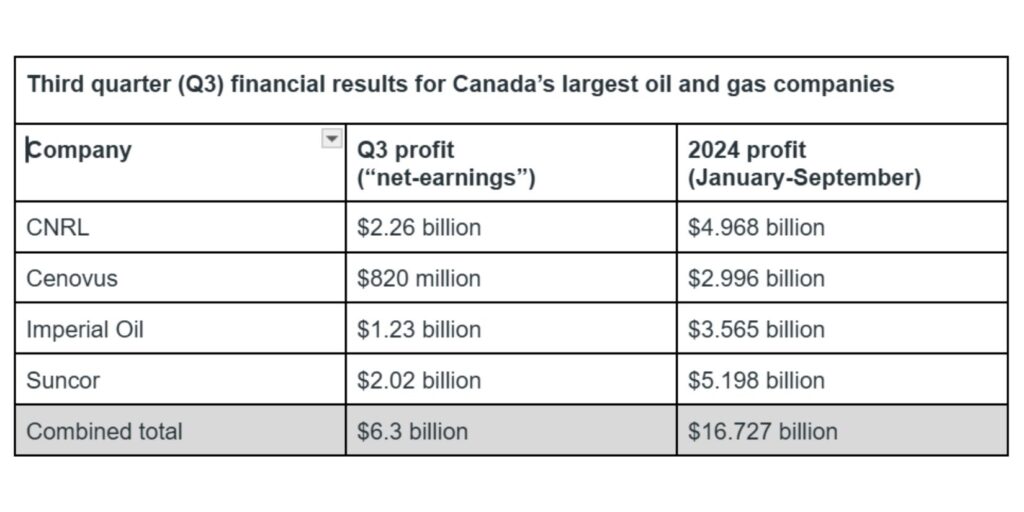
The day after nations from around the globe gathered to begin this year’s United Nations climate negotiations, Suncor posted over $2 billion in profits for just three months.
Suncor was the last of the four largest Canadian oil companies to report its profits for the third quarter, known as Q3, which is the period from July through September. These four companies are responsible for nearly all tar sands production in Canada. Suncor, Cenovus, Imperial Oil and Canadian Natural Resources Ltd. posted combined profits of $6.3 billion for Q3 and $16.7 billion so far in 2024.
A key focus of the international climate negotiations conference this year, COP29, is who pays for climate action and the cost of responding to climate disasters. Specifically, it’s about the urgent need for wealthy nations to deliver fair compensation for Global South countries who have contributed the least to climate change while being hit hardest by the crisis.
For decades, countries like Canada—and especially private oil and gas companies operating here—have reaped substantial financial benefits from fossil fuel extraction. These companies receive billions in profits each year, but are rarely held accountable for the climate damage caused by their products. Where’s the fairness in that?
 It’s important to remember that the staggering $6.3 billion in combined profits posted for Q3 is what remains from the billions more in total revenue, after shareholders, CEOs, other operating expenses and investments were paid.
It’s important to remember that the staggering $6.3 billion in combined profits posted for Q3 is what remains from the billions more in total revenue, after shareholders, CEOs, other operating expenses and investments were paid.
As the world demands that wealthy companies and governments pay for climate damage, and countries in the Global South are pushing for fair compensation, oil companies continue to pocket billions that could otherwise fund climate solutions. It’s time to make polluters pay!
One way Canada can free up the money to pay its fair share is to end fossil fuel subsidies. Pressure from Canadians pushed the federal government to promise that it would eliminate subsidies by the end of 2023, but in practice, the changes haven’t gone far enough. From our tracking we know that oil and gas companies still received over $5.5 billion dollars from the Canadian government in 2024. That’s likely an underestimate because data isn’t available for many types of subsidies. Millionaire fossil fuel CEOs with billion-dollar companies don’t need government handouts. Canada needs to fully stop all payouts to oil and gas companies and put that money where it’s most needed to address the climate crisis.
Another solution would be for the Canadian government to institute an excess profits tax on oil and gas companies. Governments around the world have implemented similar windfall taxes on oil and gas profits, and the Government of Canada recently considered it for the 2024 budget delivered in April, but backed out of the idea after pressure from the oil lobby.
So, when will Canada stand up to Big Oil and make polluters pay for, rather than profit from, the climate crisis?
Tell the government it’s time to stop Big Oil 
The post Big Oil pockets billions while the world negotiates who pays for the climate crisis appeared first on Environmental Defence.
This post was originally published on Environmental Defence.